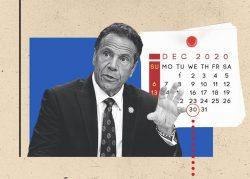When Joe Biden won the 2020 election, there was a significant hurdle between the president-elect and some real estate reforms he wanted: a Republican Senate.
That changed Wednesday when two Democrats won Senate seats in Georgia. Biden’s proposals have a better chance of making it to the floor with Democrats holding half of Senate seats, Kamala Harris poised to cast tie-breaking votes as vice president and Sen. Charles Schumer, D-New York, as majority leader.
To be sure, such tenuous control hardly guarantees that Biden’s campaign priorities will become a reality. Democrats need at least 60 votes to overcome a filibuster, meaning they need to win over at least 10 Republicans — a virtual impossibility for anything controversial or remotely partisan, such as eviction bans or dismantling the 2017 tax law.
But a workaround known as reconciliation enables Senate passage of some taxation and spending measures with a simple majority. Republicans used it to pass the 2017 reform, as well as tax cuts in 2001 and 2003. Democrats used it for some elements of Obamacare.
So the real estate industry is closely watching a number of policies and tax breaks that Biden highlighted during his campaign or pitched as a response to the pandemic. They include:
Tax deductions and rates
The Tax Cuts and Jobs Act of 2017 capped deductions of state and local taxes at $10,000, ostensibly raising the cost of living and home ownership in high-tax states such as New York, California and New Jersey. Last year, House Democrats passed a bill that would have increased the cap to $20,000, but the Senate ignored it. Such a measure would have an easier time with the Senate led by Schumer, who opposes the cap, as do many blue-state Democrats.
Biden has said that he wants to increase high earners’ taxes on payroll, capital gains and income. He has also proposed increasing the corporate tax rate to 28 percent from 21 percent, after Republicans lowered it from 35 percent in 2017. While that would cost some real estate businesses more, it could benefit affordable housing developers.
An increase in the corporate tax rate could make Lower Income Housing Tax Credits more attractive. Corporate investors who buy the credits receive a reduction on federal income taxes for 10 years, so the credits are worth more when there are more taxes to offset. When tax rates go down, the credits lose value. That affects how a project pencils out.
Hudson Companies’ Aaron Kaufman said he was in the middle of negotiating loan terms with a bank on an affordable housing project just before the 2017 tax law passed. The possibility of the corporate tax rate being decreased shaped the debt terms because many expected the tax credits to become less valuable. He said an increase of the corporate tax rate could help reverse that.
“It is going to bring the price per dollar of tax credits up,” he said. “It’s a game-changing win to increase corporate taxes.”
As part of the latest federal stimulus package, Congress divorced the program’s rate from interest rates, instead setting a floor of 4 percent. The change was considered a major win for affordable housing developers.
1031 exchanges
During his campaign, Biden announced a plan to eliminate 1031 exchanges for taxpayers with annual incomes that exceed $400,000.
The widely-used tax benefit has been on the books for 100 years. A 1031 exchange allows real estate investors to defer capital-gains taxes when they sell properties, if they use the proceeds to make new investments, typically within a few months. Keep doing that, and taxes can be perpetually deferred. One wealth adviser called that “swap ’til you drop,” and estimated that $100 billion a year in property sales can be attributed to 1031 exchanges.
The benefit is popular with retirees, but with Democrats in control of both houses of Congress, its elimination for high earners may be on the horizon — a possibility that has federal real estate lobby groups concerned. Developer Francis Greenburger called 1031 exchanges “an extraordinarily important element in real estate investment.”
“There will be enormous unintended consequences if they are allowed to go forward in the way he proposed,” said Greenburger, a longtime supporter of Democrats.
Greenburger, who wrote to the Biden campaign after the former vice president announced his intention to limit the benefit, said that he and others in the business community recognize the need to raise taxes as the country grapples with a lengthy and expensive pandemic.
“Anyone who is not blind and stupid knows we have a huge deficit,” said Greenburger. But altering the fundamental structure of the tax code is not the way to close it, he said.
“Raise the rate,” Greenburger offered. “That doesn’t disrupt entire ways of doing business and entire areas of activity and investment.”
Opportunity Zones
Biden has pledged to reform the Opportunity Zone program, which was included as part of the Republicans’ 2017 tax overhaul. Though President Donald Trump has touted the program as a boon to “neglected neighborhoods,” others have argued that it mostly benefits developers.
States selected the 8,700 zones, which were then certified by the U.S. Department of the Treasury. Critics have called for a reconsideration of these zones — some of which include well-off neighborhoods — and for more transparency and reporting requirements to ensure they are actually helping poor people.
“The problem with the Opportunity Zone legislation is that it was rushed through,” said Ronald Fieldstone, a partner at Saul Ewing Arnstein & Lehr who focuses on tax law, noting the lack of public disclosure required by the program. “There is no accountability.”
In November 2019, Sen. Ron Wyden of Oregon introduced legislation that would ramp up reporting requirements and limit Opportunity Zones to low-income communities.
Read more



Next round of stimulus
Senate Majority Leader Mitch McConnell blocked a proposal for $2,000 stimulus checks in December, leading to the passage of a relief package that instead sent $600 checks to Americans. Schumer, who will take McConnell’s place, has indicated that he will make $2,000 checks a priority.
Some New York officials are confident that having one of their own lead the Senate will benefit the state. Gov. Andrew Cuomo said Wednesday that a Democratic-controlled government would lead to a more favorable federal stimulus, as well as a reversal of moves by congressional Republicans that damaged New York.
“They have been unethical. They have been political,” he said during a press conference Thursday. “They have taken money out of this state and sent it to the Republican states as a pure political exercise.”
According to federal lobbying groups, a Democrat-controlled Congress, with Biden’s support, would favor a means-tested approach to rent relief, in the form of rental vouchers. The industry has been supportive of such an approach — which is seen as a welcome measure to stabilize the rental market — unlike proposals to cancel rent.
Federal eviction moratorium
The temporary federal limits on evictions stem from a September Centers for Disease Control rule allowing some renters to use financial distress as a defense against eviction. The rule is set to expire Jan. 31, but with both houses of Congress controlled by the Democrats, a new relief package could limit evictions even more.
Such a proposal was floated in October when the House of Representatives passed a $2.2 trillion relief package which would have halted evictions for 12 months — exceeding even the five-month ban in place in New York.
That measure would have not only given renters a defense against evictions, but prevented landlords from filing any evictions for non-payment. The bill would have also given delinquent borrowers automatic forbearance. It included $50 billion in emergency rental assistance, twice the amount which was eventually approved by the Republican-controlled Senate.
Any resurrection of a longer eviction ban would still need to muster 60 votes in order to avoid a Republican filibuster.
